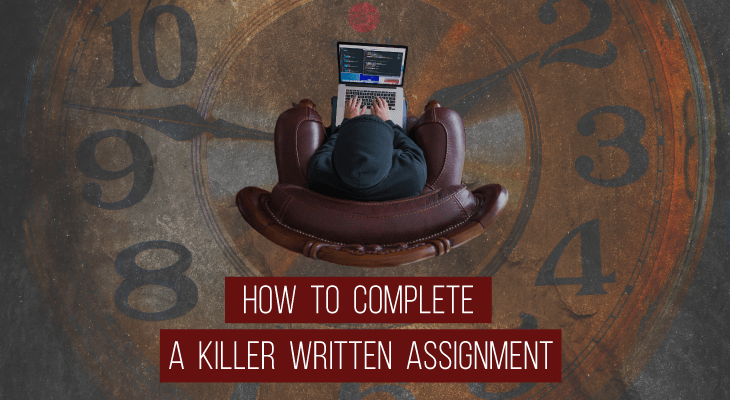How to Complete a Killer Written Assignment
Writing that 20-page assignment is anything but fun, so here are 9 tips to help you through each step of the way!
Updated 01 Aug 2018

Written assignments — they can be a real pain but are an inevitable part of your college experience. They can also be a godsend if all hope of redemption for your final grades are looking grim.
Now that you’ve accepted it as a necessary evil, here are some tips on how to tackle your assignments with ease!
#1. Convening your crew

If you’re tasked with a group assignment, this decisive first step is arguably the most important and will set the course of your sanity in the weeks leading up to the due date.
Choose responsible members and people you know you work well with. It’s okay to be ruthless ㅡ now is not the time to be teaming up with your best pals who aren’t going to get down to business.
If your teacher insists on assigning groups (eew, we know), all is not lost. Open the lines of communication by starting a Facebook group to keep everyone updated about the assignment’s progress and inform them about any scheduled group meetings. As a point of reference and to better facilitate the compilation process, it also helps to pick a leader regardless if you’re required to or not.
PRO TIP
Stuck in a nightmare group of abhorrent individuals? Here are some tips for being the most diplomatic version of yourself in a team of terrible group members.
#2. Eyeball the instructions

Disregarding the assignment instructions could have crippling repercussions especially if you’re taking the subject for the first time or if you’re working with an unfamiliar lecturer.
Before even reading the question, take note of the technical requirements such as the due date, format, number of words, citation style and any other strange requests your lecturers might have. After all, you don’t want to be penalised later for failing to abide to trivialities like font size or spacing.
When scrutinising the assignment question itself, look out for common verbs like ‘summarise, analyse and argue’ to see what you’re meant to do. You should also determine the focus of your thesis statement and what the bulk of the content should be about.

#3. Divide and conquer

For group assignments, it’s important to set up a meeting from the get-go and encourage everyone to do some preliminary research on the question beforehand. Brainstorm a skeleton argument which you can use to divide tasks fairly among one another.
#4. Consultation is key

Once you’ve come up with your skeleton argument, make an appointment with your lecturer who can skim through your draft to see if you’re on the right path.
You can also use the opportunity to seek further clarification about the assignment. However, don’t sneakily try to elicit answers from them ー they can suss out your ulterior motives within minutes and that’s not a good look!
Instead, use the Corson technique, which suggests that you spend 15 minutes attempting the problem on your own first before asking for help. This shows your lecturer that you’ve put in the effort to work things out instead of seeking quick and easy answers.
Apply for university with EduAdvisor
Secure scholarships and more when you apply to any of our 100+ partner universities.
Start now#5. Take a (brain) dump

Parking yourself in front of your laptop and actually getting started on that 10,000-word essay can be an overwhelming process.
To kickstart your writing gears, here’s what you can do:
- Open up a blank document
- List out all the main points you might need
- Identify resources that could be useful (e.g. lecture notes, articles from your tutorials, chapters from textbooks)
- Write down relevant questions that need to be answered during research
This ‘thought vomit’ exercise is a great way to get the ball rolling, especially if you’re a perfectionist who often feels the pressure to immediately produce a perfect assignment. On top of that, you can also use these points and questions to aid with more focused research.
#6. Research responsibly

Start with the materials you already have such as lecture notes and textbooks to gauge the scope of your assignment. You can then expand your research to the world wide web using credible websites, online journal databases that your university is subscribed to and free ones like Google Scholar.
It helps to compile your resources so they are easily accessible when you start writing. Once you have everything you need, mark out the relevant parts to help you construct your arguments.
If you’re using online materials, download the material you need and read them offline to avoid falling into a vortex of overstimulation. Set a time limit for your research and ensure you start writing once you’ve reached that limit. All the research in the world will not write that paper for you.
PRO TIP
Consider yourself a Google whiz by now? These tips might just make your research a lot easier.
#7. Write your first draft without inhibitions

Sitting down to actually write that paper can be incredibly intimidating. However, acknowledging that your work doesn’t have to be perfect on the first try will make it easier for your thoughts to flow without perfectionism as a censor.
When you first start writing your essay, flesh out the main points you put down during the ‘brain dump’ phase and do so without editing yourself. This means ignoring spelling errors, strange sentences and even incomplete information — you can come back to them later.
Your first draft is bound to tank but it’s okay because you’ll always be there to edit it in the future.
PRO TIP
If you’re compiling a group assignment, edit your members’ work individually first so they can make corrections if necessary. Once all the amendments have been made, compile everyone's work into a single document and chisel your masterpiece from there.
#8. Sculpt your work of art

Once you’ve got the bulk of your assignment in front of you, it’s time to polish and refine it until it’s worthy of that ‘A’.
Start with a content edit to check that the thesis statement answers the assignment question and that the content adequately supports your thesis. To improve organisation and readability, read your essay aloud and analyse your content structure while removing unnecessary words. Once you’re happy with the content, do a quick technical edit by skimming through the paper to identify typos, grammatical errors or wonky sentence structures.
At this juncture, it also helps to have a fresh pair of eyes determine if your paper is communicating your point clearly.

#9. Take steps to counter copycat-ism

If you’re still moaning and groaning about typing out your citations, it’s about time you jump on the tech train with these apps that will do all the work for you.
Citing your sources is doubly important to avoid plagiarism. It’s probably been drilled into your head that plagiarism will not be tolerated under any circumstances by your lecturers and could bring about some severe consequences if discovered. Run your assignment through one of these plagiarism checkers to avoid getting into a sticky situation.
Now that you’re equipped with the tools to smash that essay, all that’s left is to go out and do it. We believe in you!






